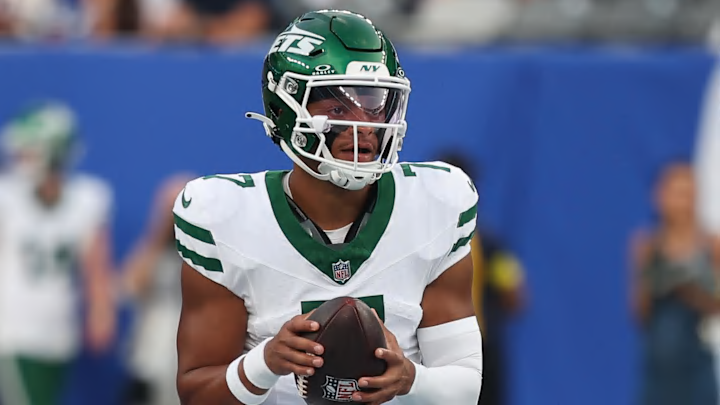The New York Jets’ 31-12 preseason loss to the Giants on Saturday night told fans more about their offensive philosophy than the scoreboard ever could. For all the miscues and missed opportunities, the real takeaway was how the team showcased its blueprint for 2025.
Justin Fields threw just five passes on two drives, completing one for four yards — a four-yard checkdown to Mason Taylor on his first attempt of the day. Even on his best drive, a 12-play, 52-yard series that ended in a field goal, he didn’t complete a single pass.
Instead, the Jets leaned on the run and short gains to move the ball, a preview of how they intend to build around their new quarterback. This wasn’t by accident, either.
The Jets are signaling that their offense will revolve around the ground game, masking Fields’ limitations as a passer while emphasizing his athletic strengths. It’s a crystal-clear stance on how they view him and how they plan to compete this season.
The Jets understand Justin Fields' strengths and limitations as a QB
When the Jets signed Fields to a two-year, $40 million contract this offseason, they did so with no illusion that he would be their long-term quarterback solution.
Fields offered a degree of upside that many of the other potential bridge starters didn't have after the team decided to move on from Aaron Rodgers, but his struggles in Chicago and Pittsburgh were well-documented. The Jets knew that Fields remained a work in progress.
That notion has held true so far this summer. Fields has flashed his upside and has gotten more comfortable in a Jets offense clearly built to emphasize his strengths, but the growing pains have also been evident.
The same issues that have stalled his NFL career — inaccuracies, slow processing, and taking too many sacks — are still there. Fields hasn’t suddenly transformed into a different quarterback in Florham Park.
The Jets realize this, though, and Saturday's preseason game showcased the albeit vanilla blueprint — for better or worse — for what this offense will look like in 2025.
It’s a run-heavy approach designed to grind out long drives, limit mistakes through the air, and lean on Fields’ legs as much as his arm. The passing game will exist, but only as a complement, not the centerpiece.
The Jets are aware of Fields' physical strengths, but, more importantly, they're acutely aware of his limitations as a passer. The goal of this offense will be to maximize their new quarterback and the talent around him.
Saturday’s loss proved there will be plenty of bumps in the road, but the groundwork has been set for how the Jets plan to move forward. Now it’s just a matter of whether Justin Fields can make that plan work when the games start to count.
